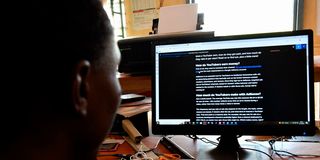Access to internet critical to Kenya’s growth strategy

Africa’s internet economy has the potential to reach over $180 billion by 2025, contributing 5.2 per cent of the continent’s GDP.
Last week’s column briefly discussed the digital economy and outlined its potential to significantly contribute to Africa’s GDP, if accurately tapped and well-managed.
We saw that Africa’s internet economy has the potential to reach over $180 billion by 2025, contributing 5.2 per cent of the continent’s GDP. We also noted that the Internet economy is projected to reach over $712 billion by 2050 and contribute 8.5 per cent of the continent’s GDP.
The World Bank has identified five key foundational building blocks of a thriving and inclusive digital economy. These are digital infrastructure, digital platforms, digital financial services, digital entrepreneurship and digital skills. In the next few columns, we will dissect each of these five foundational blocks.
Kenya is without doubt a regional leader in information, communications and technology. Public investments in critical infrastructure such as the National Fibre Optic Backbone Infrastructure (NOFBI), coupled with relevant ICT policies and national strategies and a vibrant, world-renowned start-up industry have earned the country the moniker ‘Silicon Savannah’.
However, in spite of the many significant strides we have made as a country, there are several critical gaps in the ICT ecosystem Kenya needs to address urgently to maximise the dividends of the digital economy.
One of the critical gaps is that of digital infrastructure. While we boast fast internet speeds and mobile telephone penetration levels, a significant section of Kenya’s population is yet to tap into the thriving digital economy because the Internet and devices remain largely unaffordable.
Basic knowledge
They also lack basic knowledge of how to use the Internet and digital devices. Studies by World Bank have shown that while nearly three-quarters of Kenya’s population live in rural areas, only 17 per cent reported to have used the Internet on a weekly basis, signalling a worrying trend that technology in the country remains largely an elitist and urban affair. It is available only to the few who can afford it and have the knowledge to tap into the digital economy.
The Kenya National Digital Masterplan (2022-2032), acknowledges this need for an inclusive, affordable and accessible internet connection and outlines various flagship programmes to achieve this. One of the key programmes is the installation of 100,000km of high-speed fibre optic infrastructure that aims to provide internet connectivity to rural businesses, public spaces, schools, homes and government institutions.
Another key programme critical to this goal is the establishment of 25,000 internet hotspots countrywide to provide Kenya’s youth, innovators and entrepreneurs with access to the internet. A similar programme is the establishment of 1,450 village digital hubs to facilitate citizen digital literacy training.
It is clear that the first and perhaps the most critical step to a fully inclusive digital economy is to decentralise the Internet and ensure that every Kenyan has equal opportunity access to the Internet.
Dr Chege is a media and technology researcher.





